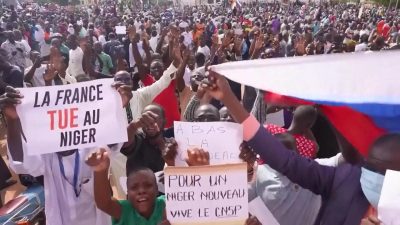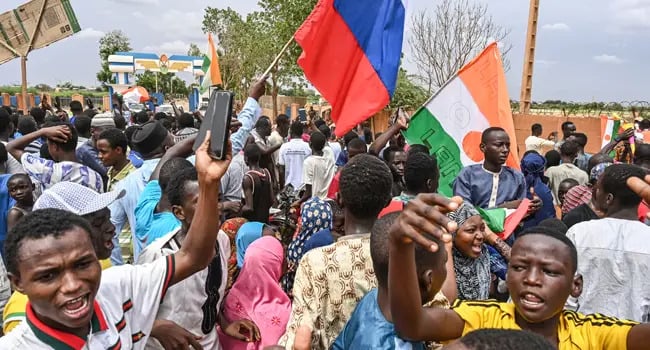French Ambassador Defies Order to Vacate Niger
Prompting a diplomatic crisis, the former colonial power is determined to remain in a country where they are not wanted

All Global Research articles can be read in 51 languages by activating the Translate Website button below the author’s name.
To receive Global Research’s Daily Newsletter (selected articles), click here.
Click the share button above to email/forward this article to your friends and colleagues. Follow us on Instagram and Twitter and subscribe to our Telegram Channel. Feel free to repost and share widely Global Research articles.
***
President Emmanuel Macron of France has publicly stated that the National Council for the Safeguarding of Our Homeland (CNSP) government in Niger has no right to withdraw the diplomatic credentials from Paris’ ambassador to the West African state.
Since the order to leave within 48 hours was issued, the stakes have grown higher in the month-long struggle between the new government in Niamey and several western imperialist countries and their allies in the region.
After the July 26 seizure of power by the presidential guard and the conventional forces, there were immediate calls from France and the United States for a military intervention by the Economic Community of West African States (ECOWAS) aimed at the reinstallation of ousted President Mohamed Bazoum. The former leader was said to have been elected democratically by the people of Niger and therefore the CNSP ruling council should not be recognized as the legitimate government.
However, since the change in government in Niger, neighboring Burkina Faso and Mali have pledged their support to the CNSP. Both governments which also came to power through military coups [supported by the Pentagon], have stated that any attack on Niger would be viewed as a declaration of war against Burkina Faso and Mali.
At the same time several African states such as Algeria, which shares a long border with Niger, are opposing military intervention by ECOWAS. Even within the ECOWAS states such as the Federal Republic of Nigeria, there is broad opposition to sending troops into Niger. The Nigerian Senate controlled by President Bola Tinubu’s own political party, the All-Progressive Congress (APC), refused to authorize the deployment of troops to neighboring Niger.
In fact, throughout the entire region diverse voices have spoken loudly against the French scheme to reimpose Bazoum. A recent session of the African Union (AU) Peace and Security Council (PSC) failed to reach an agreement on endorsing an invasion into Niger.
Therefore, the rationale being used by Macron to stage a diplomatic incident has no basis in the reality now permeating the West and North Africa regions in particular and the continent as a whole. Since the CNSP administration does not have the blessing of France, Macron claims that their diplomatic personnel, military units along with strategic economic interests must continue to operate in Niger despite the widespread sentiment against the neo-colonial status-quo.
In a speech to French ambassadors on August 25, Macron reiterated that he would support an ECOWAS military invasion into Niger. Ambassador Sylvain Itte of France has refused to meet with the new leadership in Niamey. Consequently, the CNSP believes that the ongoing presence of Itte would be a threat to the security and well-being of the country.
Macron told his foreign service personnel that:
“France and its diplomats have faced particularly difficult situations in some countries in recent months, from Sudan, where France has been exemplary, to Niger at this very moment and I applaud your colleague and your colleagues who are listening from their posts. I think our policy is the right one. It’s based on the courage of President Bazoum, and on the commitments of our ambassador on the ground who is remaining despite all the pressure, despite all the declarations made by the illegitimate authorities.”
This response to the existing crisis of legitimacy for France in West Africa illustrates the imperialist posture of Macron. In his discourse, he asserts that Paris has acted in an exemplary manner in the region. Judging from the recent political events many are disputing this perceived notion of benevolence from a former colonial power.
Tens of thousands of Nigeriens have taken to the streets since July 26 to demonstrate their support for the CNSP and its policies. This atmosphere is a direct result of the interference by Paris and Washington in the internal affairs of the uranium-rich state.
The U.S. has at least 1,100 Africa Command (AFRICOM) troops on the ground along with a military base and drone stations. France reportedly maintains a troops contingent of 1,800 aimed at guarding its dominant economic interests in the uranium industry.
People in Niger and throughout the region are incensed over the ongoing exploitation of natural resources. These resources belong to the citizens of these states, and they have a right to determine the political and economic direction of their countries.
Diplomatic Hostility and Military Threats Based on Distortions
The western propaganda saying that the former Bazoum government in Niger was the “last hope for democracy in West Africa” is a pure farce. Bazoum represented the interests of international finance capital and the NATO states.
Secretary of State Antony Blinken visited Niger earlier in the year to praise Bazoum for his willingness to extend the military and intelligence presence of the U.S. In actuality, the circumstances surrounding the ascendancy and administrative tenure of Bazoum are far from the glowing rhetoric about the purported virtues of the political leader.
An article published by Foreign Affairs on August 29 reflects a simmering debate inside the ruling circles in the U.S. over what approach to take towards the CNSP government [which is in liaison with the Pentagon]. Judging from the tone of the report, some analysts are urging that the administration of President Joe Biden distance itself from the policy orientation of France.
The Foreign Affairs report emphasizes:
“The United States, however, has broken from France to advocate for a more pacifist response. Washington’s stance has come as a surprise. The United States has generally been content to follow France’s lead in the Sahel in exchange for support for U.S. endeavors in the Middle East….
Washington’s current course is correct, and U.S. policymakers must resist calls to back an intervention. It is by no means inevitable that a proxy war between Russia and the West will break out in the Sahel. In fact, a military intervention would only increase the likelihood of more extensive meddling in the region by Russia. The junta appears interested in partnering with Moscow, but to date, Moscow has remained equivocal. In the event of a challenge to the junta by foreign militaries, however, Russia could be obliged to make good on promises to protect its African partners.”
Whether or not the Biden administration will maintain this position is largely dependent upon the direction of the CNSP government along with the burgeoning anti-imperialist movement in Niger and throughout West Africa. Although there is competition between the interests of France and the U.S., overall, the two imperialist powers have the same objectives.
Both Washington and Paris want to utilize their military and economic presence in Niger to serve as a bulwark against the growing influence of the Russian Federation and the People’s Republic of China. If France is given no sanctuary in the Sahel region to pursue its neo-colonial ambitions, it appears inevitable that AFRICOM, the Central Intelligence Agency (CIA) and State Department will seek to fill this vacuum.
By taking on even greater responsibility for ensuring the ability of imperialism to thrive unhindered in West Africa, a clash between AFRICOM, NATO and their client regimes against the popular forces and progressive governments will occur. The emergence of a clearly demarcated military conflict in West Africa involving the interests of the imperialists and those of the people would require a major expansion in defense spending and deployment of Pentagon personnel.
Washington and its NATO cohorts are already committed to military conflicts and antagonisms in Ukraine (Eastern Europe), West Asia and the Asia-Pacific. A significant expansion of this military involvement in West Africa will be paid for by the working people of the U.S. and Western Europe who are already suffering from rising prices and deteriorating living conditions.
Although it is not stated openly in the capitalist countries by the dominant political parties, the escalating imperialist war budgets are responsible to a significant degree for the impoverishment and consequent discontent of the working class and oppressed. This righteous discontent can be transformed into a political outlook which challenges ideologically the entire concept of western hegemony in favor of domestic and foreign policies which serve the majority of people within society.
*
Note to readers: Please click the share button above. Follow us on Instagram and Twitter and subscribe to our Telegram Channel. Feel free to repost and share widely Global Research articles.
Abayomi Azikiwe is the editor of the Pan-African News Wire. He is a regular contributor to Global Research.


